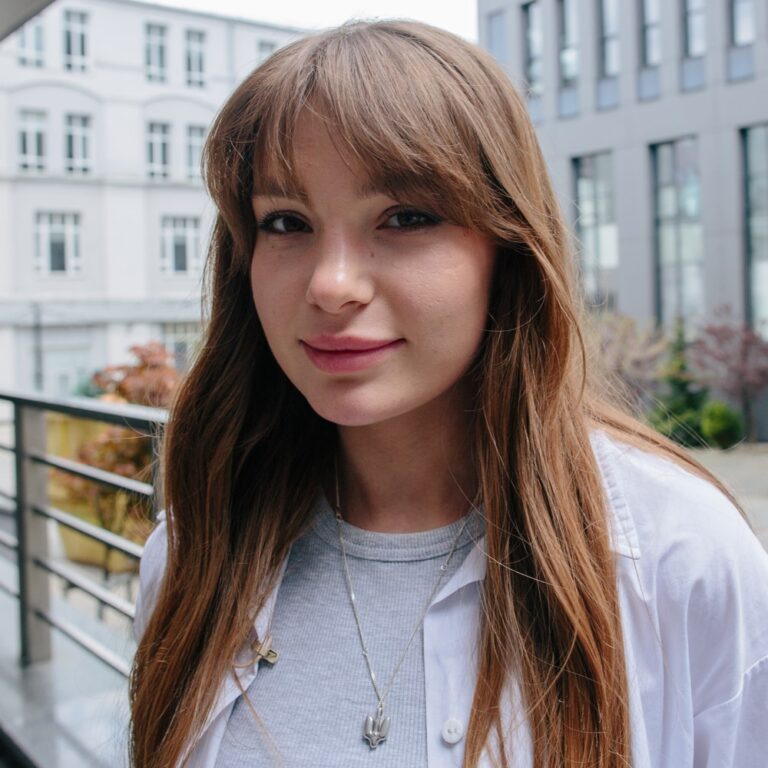Ruslana Danilkina is a veteran whose own experience with injury and prosthetics helped her discover new calling in rehabilitating soldiers. Now, the veteran assists injured servicemen in adaptation to life with prostheses, demonstrating through her own example that an active and fulfilling life continues after injury. In September 2023, Ruslana joined the Superhumans team, one of Ukraine’s leading centres for prosthetics, reconstructive surgery, and war survivors rehabilitation.
The story of Ruslana, who goes by the callsign “Sima”, is part of our multimedia project that explores the transition of military personnel to civilian life. We invited the veteran to share her experiences in the Armed Forces, the injuries she endured, the story of her recovery, and her journey towards a life without barriers.
Heading to the frontline at 18
Before the full-scale invasion, Ruslana lived in Odesa, Ukraine’s third-largest city, and worked as a waitress. The young woman first heard of the war breaking out from her mother, a soldier herself, and found it hard to believe.
“I immediately searched the internet for ‘Ukraine, 24 February’ to see the news of that day. Sure enough, I saw that the war had begun. At that time, I still lived by the sea. Then I heard the first explosion.”
Ruslana stayed in Odesa for the first few days of the full-scale invasion. Then, following her mother’s advice, she packed her belongings and moved to the countryside, hoping it would be less likely targeted by Russian attacks. However, a week later the young woman decided to return to her hometown.
“My friends texted me about making Molotov cocktails and sent photos taken in Odesa while I was in the countryside. I felt like I had run away. Watching the news and seeing those constant hits, I realised I had to return. As soon as I came back, I started collecting documents [for mobilisation] right away. I called my mother to find out what I needed, and she gave me a list I immediately started working on.”
Two months into the full-scale phase of the war, 18-year-old Ruslana enlisted in the Armed Forces of Ukraine.
“I have been very feisty since childhood, and which is why I knew I had to do it. I understood that I didn’t have the training for some sort of super missions. But I knew that no matter how much I hate paperwork, I was ready to handle that if it could help my country.”
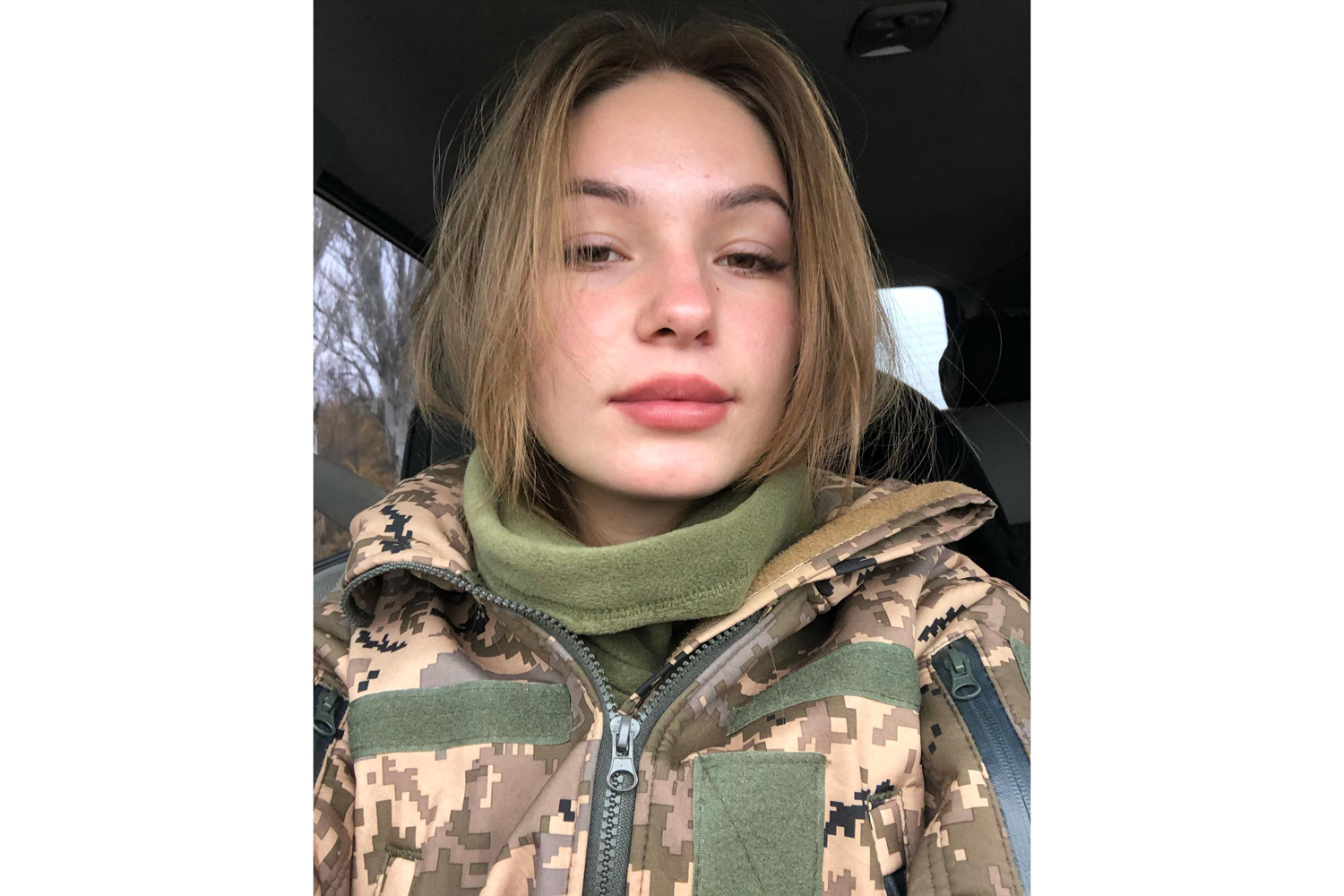
Photo: Ruslana Danilkina’s Instagram page.
After being accepted into the military, Ruslana got assigned to the Zaporizhzhia headquarters, where she collected and organised documents. Later, to complete a task that required a face-to-face meeting with a soldier, Ruslana had to go to the frontline.
“I very much dreamed of going there because I saw how every day people packed their cars, put on bulletproof vests and helmets, and went there, only to return in the evening. It was a crucial link between the rear and the main command and observation post at the front. I asked the soldiers several times to take me with them, but they just said, ‘Kid, stop making things up; sit down, stay put, and get to work.’”
Command and Observation Post
an equipped location in the rear, designed for conducting enemy and terrain reconnaissance, managing reconnaissance forces, coordinating artillery fire, observing unit actions, and maintaining communication with them.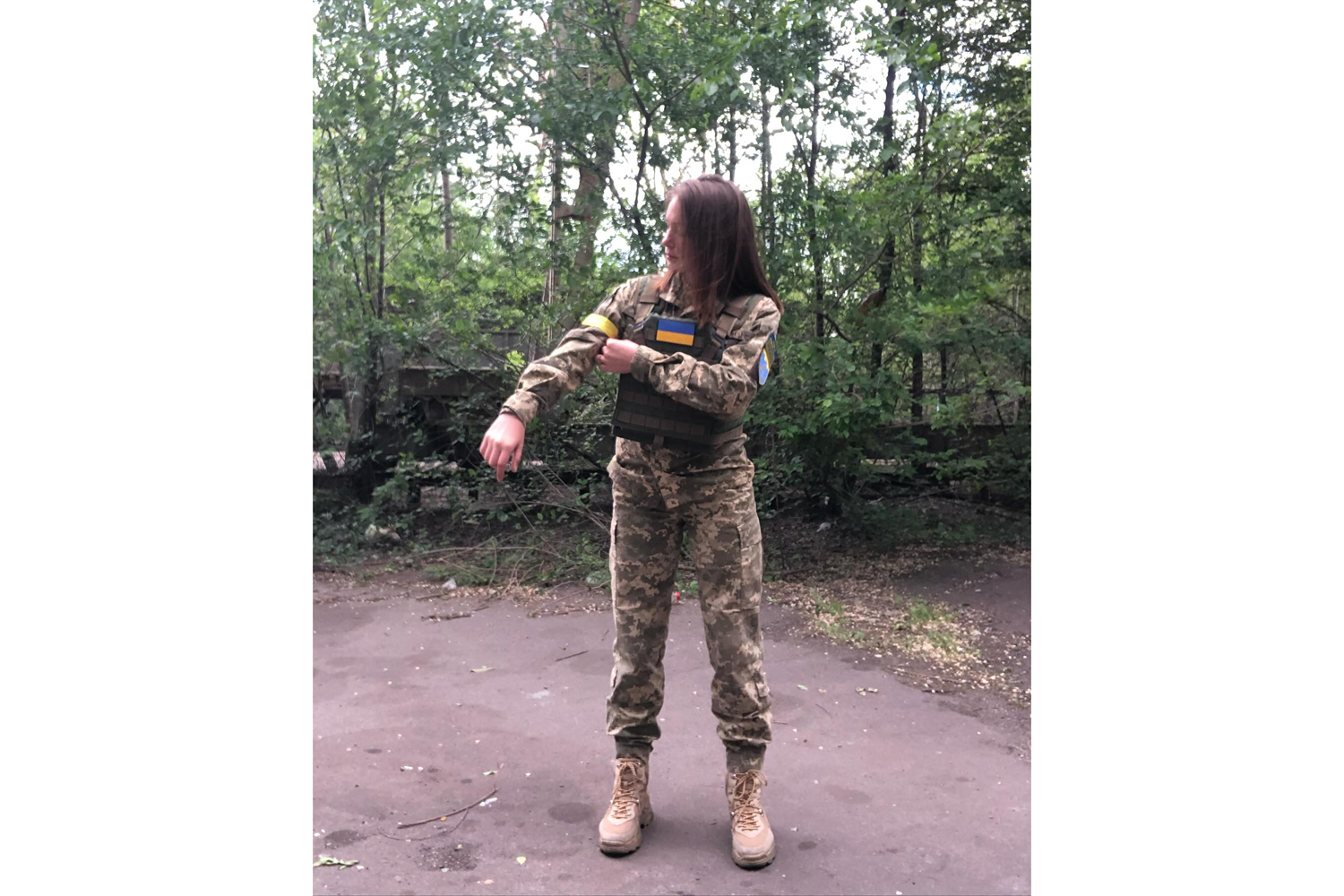
Photo: Ruslana Danilkina’s Instagram page.
When she reached the front line and found herself only 15 kilometres from enemy positions, Ruslana knew she wanted to work there rather than in the rear.
“I entered the headquarters, and it felt like a movie scene. There was a huge table with a map, a light bulb hanging overhead, walkie-talkies working, and officers running around, standing over that table, and making decisions about when and how we had to advance. I just walked in and couldn’t even move – I was frozen.”
After returning to Zaporizhzhia, Ruslana was determined to do whatever it took to get to the front line. She needed the commander’s permission to make the transfer, which she attempted to receive more than once.
“I told [the commander], ‘Please, I will do whatever it takes. If necessary, I will stay up all night to be on duty.’ And he replied, ‘Complete the assignment, and then you can come.’ He gave me a task, which I finished in three days.”
Over time, Ruslana managed to persuade the commander. Having received the permission, she swiftly packed her things, handed over her completed assignments, and moved to the front line. As soon as she arrived, Ruslana set up her folding bed and took her place at the radio.
“I spent [the first] two days with the people working there, listening and trying to memorise everything. On the third night, it was my turn [to take over]. I felt uneasy, realising the responsibility of staying on line with the fron-tline position facing the enemy. If something happened and information had to be transferred, I had to write it down very quickly and pass this data, then receive [the response] and pass it on. I felt really anxious.”
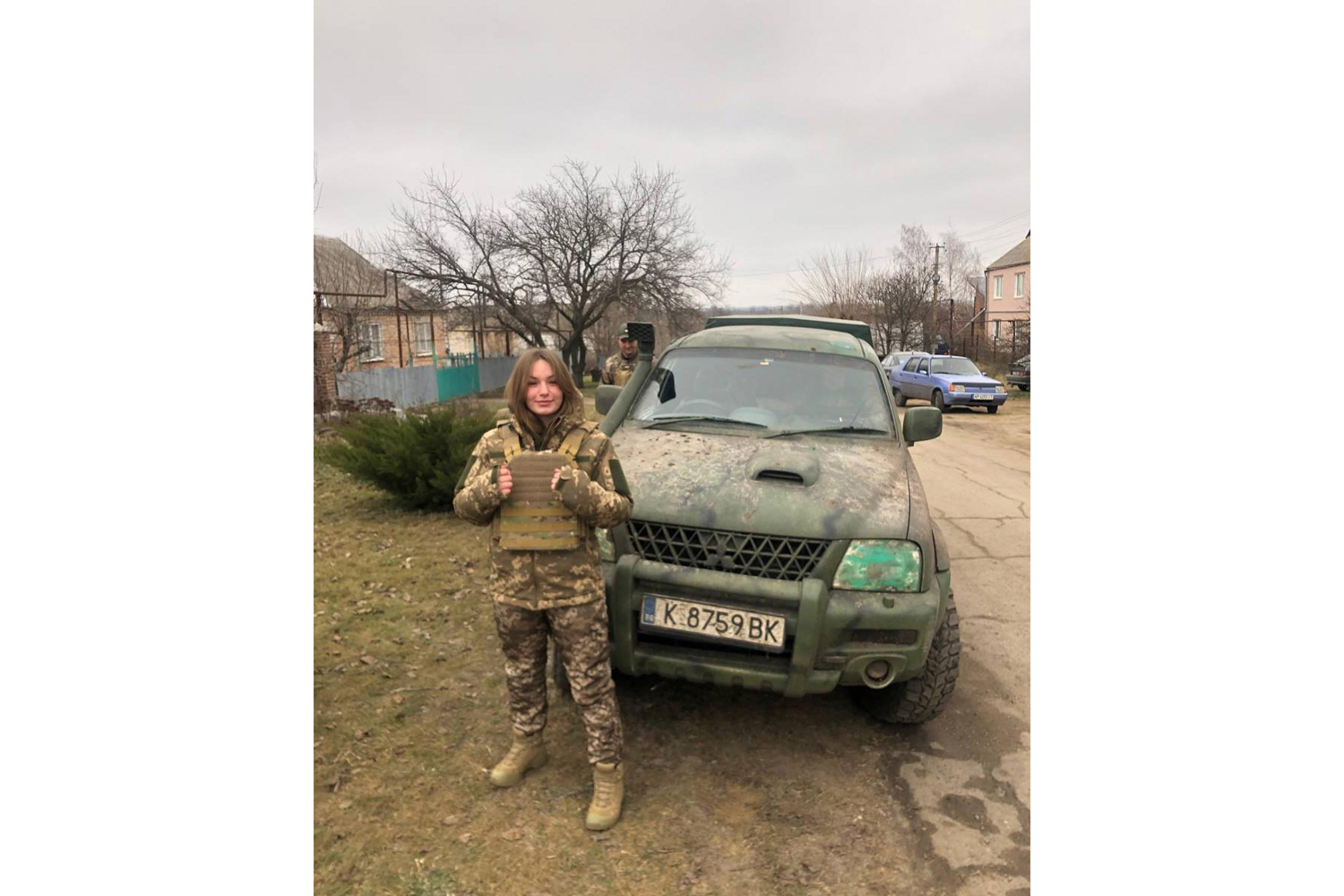
Photo: Instagram page of Ruslana Danilkina.
However, Ruslana grew increasingly accustomed to her assignment as a radio operator over time. She managed communications between the front-line position and other units, transmitted information about shelling, missile launches, or artillery strikes, and called medics for evacuation. In addition to those tasks, she was responsible for recording everything happening around – every sound, movement of equipment, the number of deployed shells, and the count of wounded or dead servicemen. Ruslana admits that recording casualties was the most challenging part of the job. Sometimes, the wounded died before the operator could reach out to the medics. In other cases, she recorded the launch of enemy missiles at night and then read the news about the injured and the dead the next morning.
“I realised that there was no choice, so we all had to hold steady. You can’t just give up and leave everything behind. You have to be here and do your job. At least, I promised my commander to do so, claiming that I would handle whatever was necessary and make it work. I had no right to make a mistake or give up.”
Over time, Ruslana recalls, shelling became more frequent and felt like a routine. If she woke up in the middle of the night to the sound of Grads (Russian multiple rocket launcher – ed.), she would quickly fall asleep, relieved by the thought that it wasn’t an S-300 (Russian long-range missiles – ed.) anti-aircraft system, and therefore the danger wasn’t as great. Although the servicewoman had an option to return to the rear, she chose to stay in her position voluntarily. Ruslana admits she felt a strong sense of responsibility to her commander and comrades.
In the summer of 2022, the situation in her area of the front worsened, with a significant increase in artillery fire, infantry assaults, and enemy aircraft deployment. During this time, Ruslana had to work harder. Although she was eligible for a vacation to rest, she didn’t want to leave the team.
“If I left, their rotations would become more frequent, the workload would increase, and everyone was already tired and struggling. How could I leave?”
A sense of responsibility, along with support and care of her loved ones, helped Ruslana to keep up with the stressful workload. Another key motivation was her niece.
“My brother sent me a photo of my newborn niece. And I just started shouting to everyone in the headquarters, ‘I’ve become an aunt!’ It was a very joyful moment. But as I just started sharing my impressions, the shelling began. I simply put the phone down and get back to work.”
Despite her young age, Ruslana never felt like she was not taken seriously in the army. On the contrary, the commander relied on her, and she quickly got along with her brothers and sisters in arms.
“They saw me as a soldier. Sometimes, they treated me like a girl, but it was actually nice. We could sit down at night, open cans, and eat together. I exchanged experiences with those older men, discussing what awaited us in civilian life once we returned. Such conversations unite people as they transcend from person to person.”
The story of the injury
After ten months in the Zaporizhzhia region, Ruslana’s unit was transferred to Kherson, which was already liberated at that time (Kherson was occupied in the first days of the full-scale invasion and reclaimed by Ukrainian troops on 11 November 2022 – ed.). Previously, her command centre operated in the fields, allowing her to easily distinguish Ukrainian fire from enemy shelling. Ruslana recalls that in Kherson with its high-rise buildings, incoming hits sounded different, making it more challenging to determine the distance of enemy impacts.
It was in the Kherson direction that Ruslana sustained an injury leading to the amputation of her leg. As her unit came under enemy fire, she received a direct hit to the knee. Although she immediately understood that her left leg would have to be amputated, Ruslana tried to convince herself that the limb still could be saved. She recalls being in excruciating pain. Fortunately, combat medics from another brigade happened to be passing by and provided aid just in time. The woman was taken to a hospital in Kherson, where her left leg was amputated.
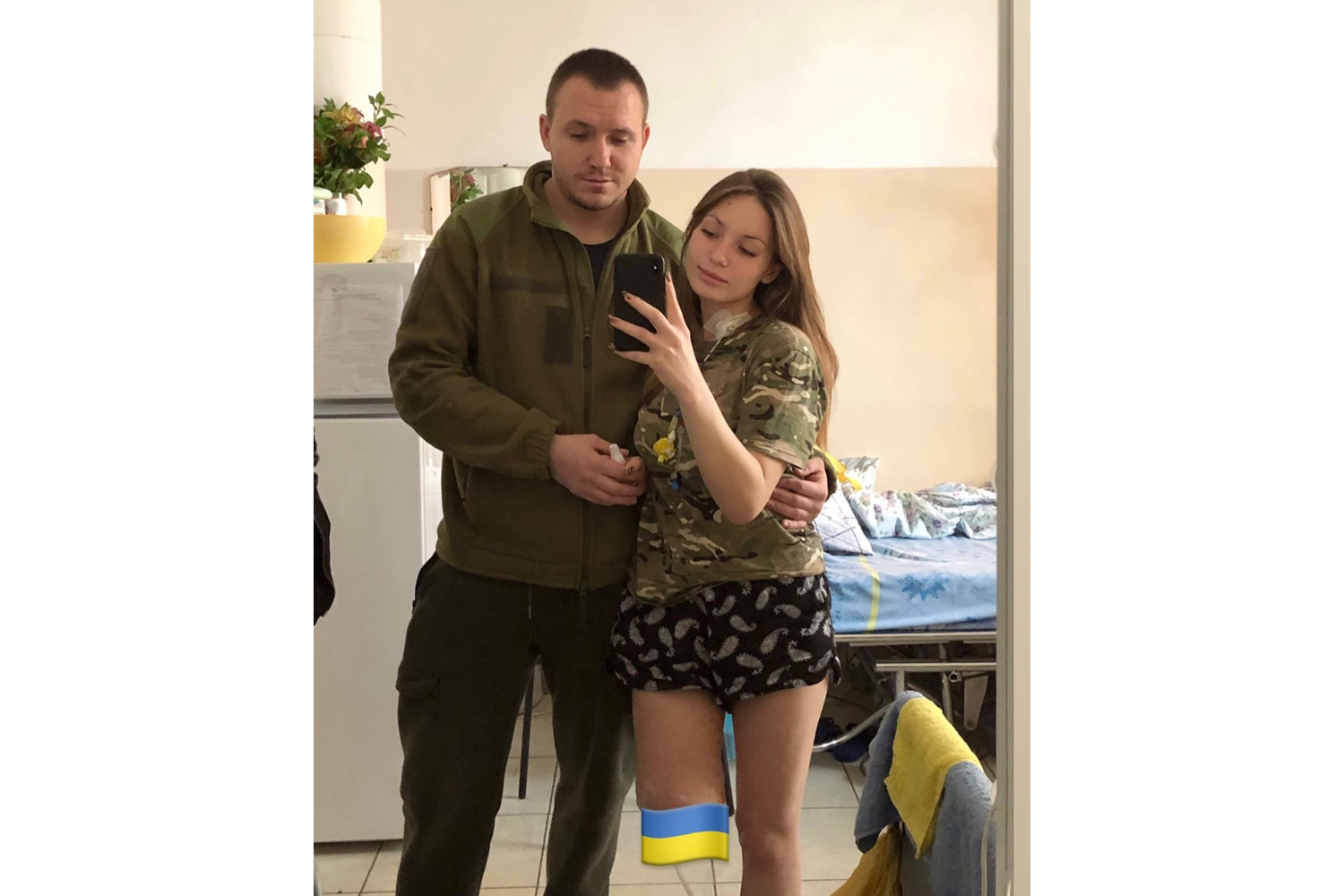
Photo: Instagram page of Ruslana Danilkina.
Ruslana regained consciousness on the way to Mykolaiv, a city between Kherson and her native Odesa. She recalls immediately touching the place where the leg should have been, only to realise that it was gone, which made her cry. It marked the beginning of the period that she describes as her “visit to hell”, as even the slightest movement caused pain.
“On the third day, I was exhausted from crying… Every time I had to do something during the day, like moving, eating, or going to the restroom, those moves brought torments of pain.”
Ruslana tried not to cry to spare her family from distress, as they were by her side all the time. She found it painful to see how much they worried about her.
“Then I promised myself that I would try to do it [crying] less. Besides that, my commander was supposed to visit me. I couldn’t let him see I was struggling. I was perhaps more worried about my commander’s reaction than the one of my parents because I had made a promise to him. And my parents, who served in the ATO and elsewhere themselves, realised what war was like.”
Ruslana remembers how her commander with the callsign “Buk” came to Mykolaiv to visit her in a hospital.
“I rode to him in a wheelchair, saying, ‘Buk, everything is fine. In a couple of months I’ll get a prosthesis and go back to the service. We’ll keep working together.’ And he was like, ”Come on, Sima, let’s skip this ‘continue working’ thing.’”
ATO
the official designation for the Ukrainian military operation in the Russian-occupied Donetsk and Luhansk regions from 2014 to 2018. In 2018, the ATO was succeeded by the Joint Forces Operation (JFO), which continued until the full-scale Russian invasion in February 2022.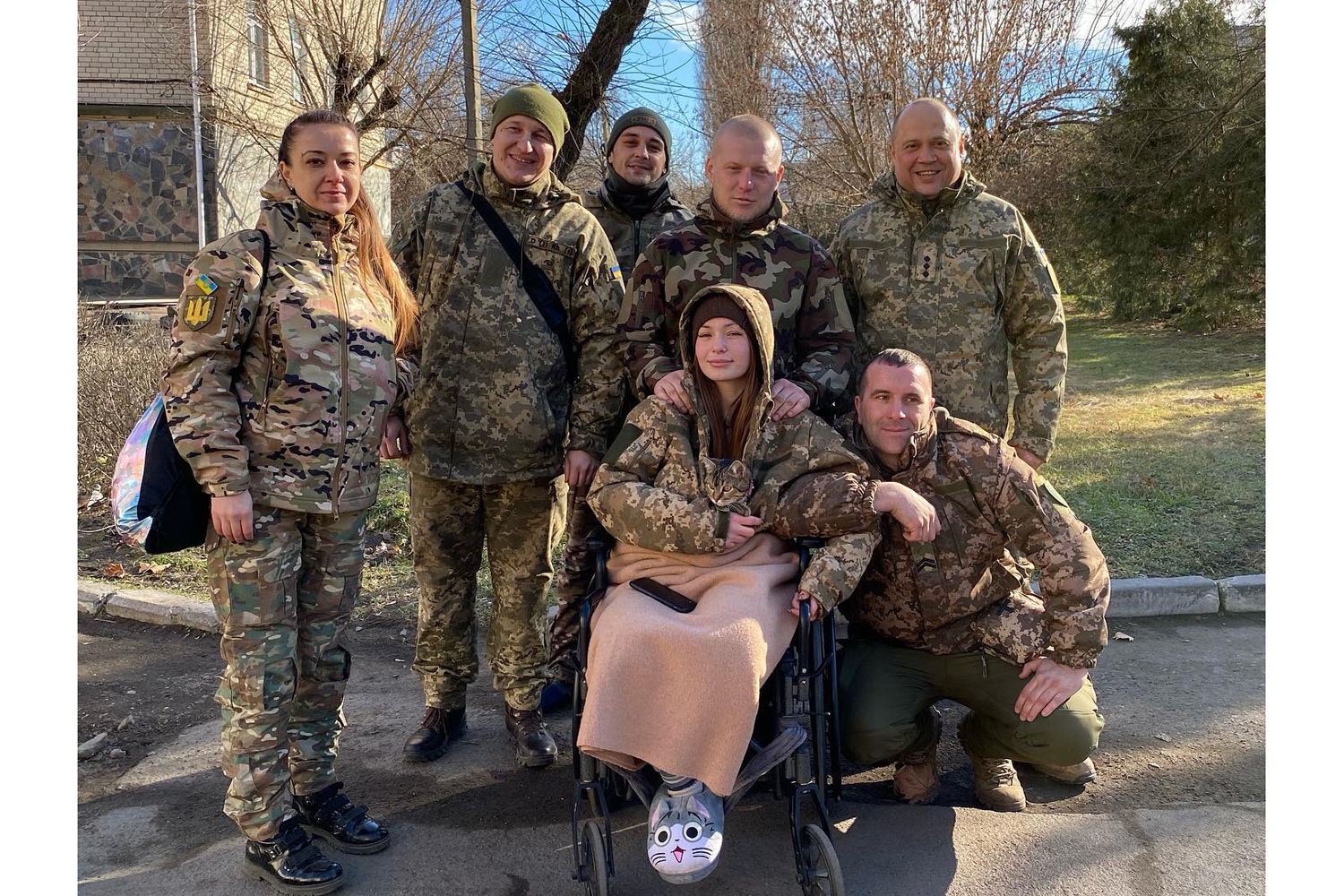
Photo: Instagram page of Ruslana Danilkina.
Rehabilitation after losing a limb
Now, Ruslana feels comfortable talking about her injury, because this empowers her to inspire and educate others. Ruslana believes this is now her mission – to show other soldiers that life goes on, although she once also believed that losing a leg would be extremely difficult to endure.
“Everyone thinks it would be better to be killed than to live with a disability. Ask any serviceman who voluntarily went to the front. Most would rather not return at all than return with a disability. I went there with that same mindset.”
Although the injury changed her life, Ruslana does not regret her decision to join the army.
“I cried a lot after losing my leg — I wept non-stop. I felt awful and didn’t want to live. I refused to accept that this would be my life from now on. I was like, ‘Leave me alone, don’t bother me, I’m done. I don’t want to either eat or sleep.’ But despite all that, I never regretted joining the army — not even once.”

Ruslana says that the war and military service made her reevaluate what truly matters. It equally concerns small joys, like taking a walk and having a coffee, and broader shifts in her worldview.
“When you get injured and lose a certain part of your body, you realise how nice it was just to walk. When you put on a prosthesis and start doing things you couldn’t do just a week ago, you reevaluate all that again.”
Ruslana shares that the rehabilitation period comes along with psychological challenges on top of physical pain and a phantom sensation in her injured leg. A person with an amputated limb has to develop awareness of their new body and learn to accept it. Ruslana’s brother helped her with that. During her hospital stay, he brought a mirror to the ward so his sister could look into it and get used to her new appearance. He also took her out for walks, had lunch with her at a cafe every day, and suggested buying her new civilian clothes.
“It was very difficult for me to go out in regular clothes for the first time. I realised that now, wearing regular clothes, I would just look like a girl without a leg. When you’re standing in your military uniform, you look like a warrior who lost a leg on an important mission. It probably doesn’t change anything, but in the mind of a person who has been injured, it makes a big difference”.

During her hospital stay in Odesa, the painful realisation that life would never be the same never left Ruslana. Working with a psychologist was helpful during her rehabilitation. The veteran appreciates that now she learned to focus on the present rather than dwelling on the past, thinking about how her day passed and what she managed to accomplish. Ruslana also concentrates on the good people surrounding her despite the presence of haters, especially on social media. However, Ruslana is sure that she is the one to decide how she should live.
“I used to be very dependent on other people’s opinions, even about what I should wear, how I would be looked at if I suddenly started doing this or that, or whether someone would judge me. […] I thought, ‘Maybe I shouldn’t care about all these things at all and simply do what I want and what I like.’”
So Ruslana decided to share her rehabilitation journey on social media. Her posts received a surprisingly positive response, which she hadn’t expected. She mentions that sometimes messages from followers helped her to endure pain better than painkillers.
Over time, Ruslana learned to accept herself in a new state.
“Only after my injury did I begin to truly love myself. Before, I didn’t like my body, my life, or who I was. It was only during my service that I started experiencing pleasant impressions. After losing my leg, I jumped to the mirror, looked at myself, and realised that this is who I am. Maybe the way I am now is exactly how I was meant to be.”

Ruslana believes that no one can force an injured person to do anything except themselves. Rehabilitation specialists can teach the basics and explain how to use the prosthesis, but how a person adapts depends entirely on them.
“You have to understand what you want for yourself. I could either see myself as a victim or begin to live [differently]. I could either shut myself away behind walls or pursue my dreams instead. Every person starting their journey must figure out who they are in this world and what they want for themselves. If someone wants to live a meaningful life, they will.”
The veteran’s work at Superhumans
Ruslana has undergone five surgeries. After her treatment in the Odesa hospital was over, she was placed in a sanatorium. It was then that Olha Rudnieva, the director of Superhumans, invited her to the opening ceremony of their rehabilitation centre.
“[Olha] said, ‘You don’t have to get prosthetics at our place right now. We’ll just give you a tour and show you around.’ I arrived and immediately knew that I belonged there. I really didn’t want to go abroad, I did want to get prosthetics at home.”

Superhumans is a nationwide centre in Ukraine for prosthetics, reconstructive surgery, rehabilitation, and psychological support for adults and children affected by the war. The first facility was opened in 2023 near Lviv. It produces prostheses, offers rehabilitation, and provides prosthetics free of charge.
After her first visit to the centre, Ruslana decided to get prosthetics at Superhumans. She got a prosthesis in just three days. With a clear vision of how she wanted to recover, the veteran focused on it and ultimately succeeded.
“I started walking immediately [after getting the prosthesis]. My steps weren’t perfect, but I kept moving. I was told it would take half a year to learn how to walk and move around properly. Still, on the fifth day [after the surgery] I had already gone to Odesa and was walking confidently with one crutch – maintaining perfect gait and balance leaning on the prosthesis.”
Yet, the process wasn’t easy. Sometimes, the prosthesis caused rubbing that led to bleeding, but the veteran kept putting it on and tried to get used to it, working to adapt to it as hard as she could.
“I’ve been walking [with a prosthesis] for a year, and I’m still learning. I can pass all obstacles, run, and go up and down stairs. I can do everything, but I won’t stop there. I want to bring it all to perfection where it won’t be noticeable that I am wearing a prosthesis at all. Not because I want to hide, but because I’m sure I can perfect it to the point when it won’t be even noticeable.”

Due to her swift rehabilitation, Ruslana began helping other Superhumans patients by giving advice and sharing her personal experiences. One of the centre’s rehabilitator therapists invited her to join their team. Now Ruslana works in recreational rehabilitation, consulting with the injured, demonstrating how to work with a prosthesis, and helping them adapt.
“I want to immediately give a person an understanding of what lies ahead. I am not the kind of person to put rose-coloured glasses on a patient. I say that it will hurt, it will be difficult, and they will get really tired. There will be times when they will be angry at the prosthesis and not want to wear it because it may be challenging. But they should use it as often and as much as possible. Then it will become easier.”
Ruslana admits that she misses the army and her brothers and sisters in arms, but feels that now she is in the right place. The veteran believes she can make a greater impact by helping other soldiers and civilians recover from injuries. This sense of purpose helps Ruslana not to give up.
“Being part of Superhumans means being part of super life and super motivation. It’s intense and very cool!”

Recreational rehabilitation at Superhumans aids the patients’ recovery through activities that interest them. The centre often asks patients what they wanted to try before the injury. Ruslana participates in rock climbing and golf with the wounded. She says that initially, she and her team bring patients without prostheses to the training grounds to make them feel the movement challenges. The next time, these people arrive at the location with their prostheses.
“I show how to work with a prosthesis, helping people to understand when they can lean on the prosthesis, step on their leg, lift themselves, then attach the prosthesis again. It helps to develop the perception that this is not just metal but something that helps to function in life, something you can rely on and feel supported.”
One of the methods practised in the centre is called “peer to peer”, when veterans with amputated limbs demonstrate how to live with a prosthesis and adapt to it through their own example. Ruslana explains that it is crucial for a person to learn to trust their prostheses and lean on them as their own limb.
“Rehabilitation is not about teaching to walk with a prosthesis. Rehabilitation teaches to live with a prosthesis, helping people understand that they are now much more complete than before.”

The veteran says that as soon as she arrives at work, she immediately smiles around the patients. She understands that they motivate each other to move forward.
“This motivation, this sense of strength that comes from sharing space with them, is intense and incredible. I’ve never experienced anything like it anywhere else. Their communication, banter, and support for each other are amazing. It’s incredibly motivating and uplifting. When I feel like I’m running low on strength, I look at them and think, ‘Hey, you have to keep going.’ And they look at me the same way.”
Ruslana mentions that even military personnel with amputated limbs often notice the gaze of passers-by. If anyone wants to show appreciation, a simple smile or not looking away can be enough. She recalls a moment from her life when a woman approached her and asked whether she needed help.
“She apologised for interrupting me and asked if she could help me with something or whether I needed help at all. She didn’t just say, ‘Let me help you’. Also, she complimented me, saying that I looked very nice. It stuck in my head. We went out [of the store], she hugged me, and we talked a little. I remembered her and this moment very vividly.”

The veteran believes that people should be grateful to their defenders, but this sense of gratitude can’t be taught — it must be felt. Ruslana adds that, in her view, inclusiveness starts with individuals.
“People just need to stay human. We can make the ramps [for wheelchairs], but we will not teach people [the right attitude] unless they want to. Just like a person will not embrace their new life after amputation until they decide to do so.”

